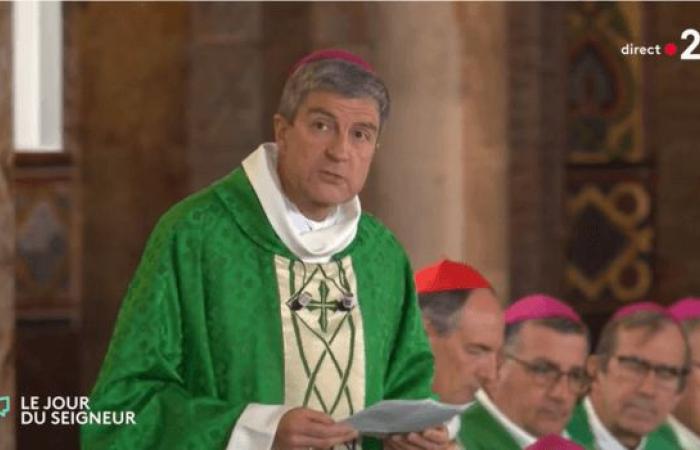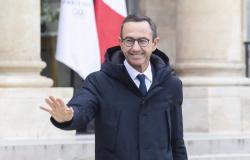
Homily for the mass of 32th Sunday of Ordinary Time, year B, November 10, 2024, in the Basilica of the Rosary, in Lourdes, televised mass of the Lord’s Day, pronounced by Mgr Éric de Moulins-Beaufort, archbishop of Reims, in front of his brother bishops gathered for the 94th Plenary assembly of the bishops of France.
Brother bishops, obviously, we take for ourselves, on this Sunday, the word of the Lord: “Beware of the scribes”. We know well that the evangelist did not collect it only to convey through time the severe judgment of Jesus on the scribes, commentators on the Torah, of his time. Saint Mark noted these words for us, for all those who would have to exercise authority in the Church, for all those who, throughout the ages, would be likely to wear ceremonial clothing – and our chasubles are undoubtedly -, and to be offered places of honor which they always run the risk of ending up considering as an acquired right.
Gathered in plenary assembly and concluding it this morning with you, brothers and sisters, we accept with good heart that these words of the Lord apply to us first and foremost. We do this all the more willingly since the synod which concluded two weeks ago, after a period of consultation with the entire Church, placed or put back at the heart of the life of the Church and its functioning synodality, that is to say the common listening to what God through the Holy Spirit wants to say to the Churches. Pope Francis, we have not forgotten, wanted to relaunch synodality as a remedy specific to the Church against any form of clericalism, any way for anyone who has a function in the Church to appropriate its mission and carry it out. serve for one’s own promotion, for one’s good will, and worse, for one’s own desire.
We meet here in Lourdes twice a year to relaunch each other in our mission. While knowing that the Lord’s warning may be aimed primarily at us, and that it is in any case understood in this way, we dare to say that it applies to everyone who is baptized. Our baptism and confirmation for all do not form a ceremonial dress, they are a dress of requirement, they call us all to greater humility. They do not make us “good people” who have a privilege to assert. Baptism and confirmation call us all to examine lucidly what we really give of ourselves and what we seek to preserve or recover more or less subtly.
*******
Immediately after the warning given by Jesus, Saint Mark reports his admiration for the widow’s gift. Jesus gives her as an example to his disciples, to all of us, baptized and confirmed, whatever our state of life or our status in the Church. We can understand this: Jesus is not asking us to give large sums to make offerings to God; he asks us to give ourselves, each and every one, entirely. He calls us to risk ourselves for the glory of God and his service. Let us note that he does not despise the donations of the rich: their donations are necessary for the great good of the Temple to exist and function. But large donations are not exemplary; Exemplary is the one who gives “all she has to live”, the one who places her being at the disposal of God. God, in Jesus, is interested neither in social status, nor in the length of prayers, nor in speeches; he has eyes to see what each and every person gives of himself in truth. Synodality, brothers and sisters, if we continue to reflect on this theme, is not primarily in the sharing of skills, although this is useful. The foundation of synodality is that we all, from every state of life and every social status, risk for God what makes us be.
Jesus experienced this gift. The mite that he throws into the Temple treasury is himself, all of himself, without reserve, from his being as an eternal Son to his body and his most intimate flesh. There is nothing he claims for himself. This is why, explains the letter to the Hebrews, he does not have to offer himself several times. He did not offer anything that would be even a little distant from him. He threw himself entirely for us into the balance, without regret, without accounting. There is no sense in imagining a reiteration. In the widow of the Temple, he recognizes the path on which the Father awaits him. It is because there are such gifts of self in humanity that it is worth going to the end, and it comes to him so that the slightest gesture in this direction, coming from the sinners that we sum, however incomplete it may be, can be valid for the truth of each human being. The solid foundation of synodality is not only what we put into it but the gaze of the Lord who sees the depths of hearts and calls to himself the gift of ourselves that we can make.
*******
All the subjects we dealt with, all the people we received: the major archbishop of the Ukrainian Greek-Catholics, African cardinals and archbishops, the leaders of the scout movements, brought us back to our fundamental mission: to offer everyone the example and grace of Christ Jesus, and do it collegially, because this service must not be a search for oneself, nor collectively a caste privilege, it must be a constant learning, carried by the whole people of God, of gift of self in truth, in the contemplation of Jesus in whom God loves us to the end.
We celebrate this Mass carrying those who are currently suffering from war, violence, and the brutality of which human beings are capable. Right now there are many widows and orphans in Zarephath and Lebanon, in Gaza and Israel, in Ukraine and Russia, in Armenia and Congo or Sudan, and there are widowers too. History easily remembers the names of the powerful and the strong; by celebrating the Eucharist of Jesus, we know that true history is woven by the contributions of those who commit their lives, knowing it or not knowing it, and in whom Christ can recognize himself. We beg for so much pain and suffering to be turned into works of justice, truth, mutual respect, reconciliation and peace,
Amen.





